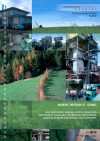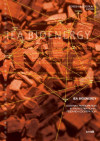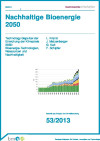Suchergebnisse
IEA Bioenergy Task 39: Biofuels to Decarbonize Transport (Working period 2022 - 2024)
The long-term goal of Task 39 is to drive decarbonisation in the transport sector using biogenic, sustainable, low-carbon fuels. This includes conventional and advanced biofuels that can be produced via different technological routes (oleochemical, biochemical, thermochemical and hybrid). In the 2022-2024 triennium, the focus was increasingly on long-haul transport, which is more difficult to electrify.
Energy-self-sufficient district Güssing
Development of a concept that shows the possibility of changing the energy supply of a district from fossil to 100% renewable energy carrier
Model region Güssing

Self-sufficient energy supply based on regionally available renewable resourcesand sustainable regional development
Forschungsforum
1/2007
Herausgeber: BMVIT
Englisch, 6 Seiten
Downloads zur Publikation
Presentation of the effective use of innovative bioenergy technologies in the Austrian energy system of the future (BioEff)
The study shows possibilities and strategies for the effective use of innovative bioenergy technologies in Austria.
Fair market conditions for virtual power plants
Analysis of technical, economical and regulatory conditions to get fair terms under competition in the liberalised market for virtual power plants on renewable energy basis.
Virtual power plants for self-sustaining regions
Geographic methods for the combination of renewable energy sources to create "virtual power plants" and development of self-sustaining regions in terms of energy-balance and the Kyoto target.
IEA Bioenergy

Austrian Participation in an international Research Cooperation
Forschungsforum
4/2000
Herausgeber: BMVIT
Englisch, 6 Seiten
Downloads zur Publikation
Technology and Innovation Roadmap "BioHeating and Cooling"

The Roadmap links with the energy research strategy of the Austrian Council for Research. It was developped together with national stakeholders from industry to deduct recommendations for policy makers. It includes clear suggestions for research topics until 2020 and provides an outlook on the contribution of biomass to the heating sector of a decarbonised energy system in 2050.
Agriculture 2020
Agriculture will become an important supplier of sustainable energy services for society. However, this sector can only fulfil this role if it operates on the base of sustainable energy provision itself. The project will determine the necessary measures to achieve this state for a concrete regional setting (eastern Styria) by the year 2020.
Pyrolysis technologies in Europe
Technology overview of medium-fast pyrolysis for decentralised applications, for small and medium-sized enterprises and for the circular economy
Virtual power plants and DSM
For the cost efficient and lasting energy supply from ecological sources, wind, photovoltaic and biomass have to be integrated in existing grids. New methods for DSM and virtual power stations are investigated, to improve the control behaviour.
Innovative Energy Technologies in Austria Market Development 2014

The market development of the examined technologies was restrained or marked by decreasing figures in 2014. An exception was the area of wind power. The use of solid biogenous fuels was reduced in 2014 due to an exceptionally mild heating period. The sum of the heating degrees for 2014 war 21 % less than the longtime average.
Englisch
Sustainable Bioenergy 2050

Specific needs for technological research and development in the sector bioenergy to reach the climate goals.
Schriftenreihe
53/2013
Herausgeber: BMVIT
Deutsch, 162 Seiten
Downloads zur Publikation
Safety and Authorization of Biomass Gasification Plants
Biomass gasification is a success promising technology for the combined heat and power production based on the utilization of domestic biomass. With this project a safety and commissioning guideline for the technology was created for the enhancement of the technology's market introduction.
IEA Bioenergy Task 39: Biofuels to Decarbonize Transport (Working period 2025)
IEA Bioenergy Task 39 is a network of international experts that aims to drive forward the decarbonization of transport with the help of sustainable biofuels, with a focus on the long-distance transport sector (aviation, shipping, heavy duty vehicles), which is more difficult to electrify. The aim of the national work is to collect and analyze information on the global technological and political status of biofuels and thus contribute to the development of sustainable, socially and environmentally compatible biofuel systems.
Local Biomass Heating Systems And Solar Energy In Austria

Models for the successful diffusion of new technologies
Forschungsforum
2/1996
Herausgeber: BMVIT
Englisch, 6 Seiten
Production of bioethanol in addition with heat, power and valuable byproducts
The production of bioethanol in Bruck/Leitha in addition to the production of heat, power and valuable by-products from biomass will be optimized by a new process simulation tool under the target of maximum usage of waste and low temperature heat and optimal source and product usage.
IEA Bioenergy Task 37: Energy from Biogas and Landfill Gas (Working Period 2010 - 2012)
Key issues for realisation and dissemination of extraction of biogas from byproducts, waste and bioenergy crops were modulated by international experts.
IEA Bioenergy Task 33: Thermal Gasification of Biomass (Working Period 2010 - 2012)
Obtaining, processing and dissemination of information about international development in the field of thermal gasification of biomass as well as leadership of several key aspects of the task.
IEA Bioenergy Task 40: Sustainable International Bioenergy Trade - Securing Supply and Demand (Working Period 2010 - 2012)
Relevant international trade currents of biomass for Austria as well as frame conditions for sustainable use of biomass have been analysed and documented. One of the key issues was to analyse certification procedures for sustainable bioenergy products.
